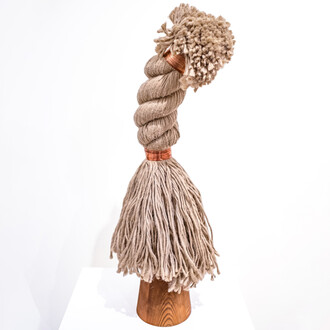For the first time, the final nine paintings by the celebrated Indian artist, M.F. Husain (1915- 2011) will go on public display at the V&A this summer. The Indian Civilization series comprises eight monumental triptych paintings, each measuring 12 feet wide by six feet high, which represent Husain’s vision of the richness of Indian culture and history. They capture India’s vibrant cities, colourful Hindu festivals, iconic figures and historic events. These imposing, large-scale artworks will be presented alongside a single painting of the Hindu god, Ganesha, which serves as the symbolic beginning of the series.
M.F. Husain is regarded as one of the leaders of the modern art movement in Indian painting. Born in Pandharpur, his early years were spent in Indore. Husain began his career as a painter of cinema hoardings after attending art school in Bombay (now Mumbai). Using freehand drawing and vibrant colour, he depicted Indian subject matter in the style of contemporary European art movements, particularly Cubism.
The Indian Civilization series, also known as Vision of India through Mohenje Daro to Mahatma Gandhi, was commissioned by the Mittal family in 2008 and have never previously been on public display. Mrs Usha Mittal has lent the paintings to the V&A, where the artist completed a residency in 1990, to showcase the final works of this remarkable artist, often dubbed ‘the Picasso of India’.
Mrs Usha Mittal said: “Spanning mythology, architecture and popular culture, the Indian Civilization Series is the final achievement of M.F. Husain, an artist whose work was continually inspired by the traditions of India. I was privileged to see this series as it was created and am delighted that it will be shown at the V&A, a lasting tribute to Husain Sahib and his vision.”
The paintings were made in London, where Husain spent his final years immersing himself in books about Indian history, which fed into the varied themes of the paintings. Each panel explores a different theme, together creating a personal vision of India, which Husain called ‘a museum without walls’. Interweaving religious and symbolic iconography with historic figures and events, the paintings also incorporate memories from the artist’s own life. Indian Civilization is a tribute to the country Husain loved but had to leave after his life was threatened for portraying Hindu deities in the nude. He lived in London and Qatar in self-imposed exile from 2006. The artist’s initial intention was to paint 96 panels exploring the breadth of Indian culture; unfortunately he died before he could achieve this ambition.
Husain’s handwritten notes, describing his ideas, themes and stories for each painting and explaining the scenes depicted, will be included in the exhibition guide. A short film directed by Husain, Through the Eyes of a Painter (1967), which won the Golden Bear at the Berlin film festival, will also be shown.
All images: M.F. Husain, Three Dynasties, 2008-2011. Courtesy of Mrs Usha Mittal © Victoria and Albert Museum, London






![Boat Building near Flatford Mill, John Constable, about 1815, England. Museum no. FA.37[O]. © Victoria and Albert Museum, London](http://media.meer.com/attachments/c123e07fd06fceaf7e5a843fe64087c80b1629ac/store/fill/330/330/cc1b3f37e83b57534b52733394b3a7a0a6e09d5aa8a6d4d51b3f4d8db054/Boat-Building-near-Flatford-Mill-John-Constable-about-1815-England-Museum-no-FA-dot-37-O-c.jpg)









